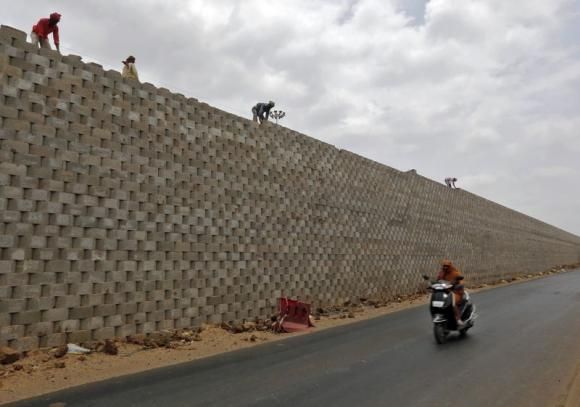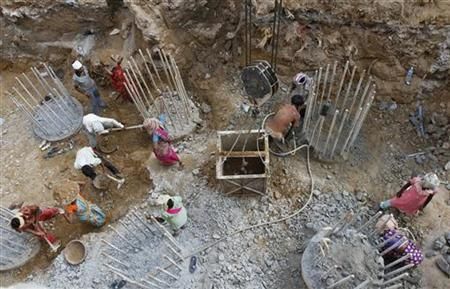Infrastructure is clearly the "elephant in the room." With able implementation, the elephant may well start dancing soon, and with it the Indian economy, says Vinayak Chatterjee.

February is clearly the 'policy month'. February 2015 has been particularly heavy with the 14th Finance Commission adding to the usual trio of the Railway Budget, the Economic Survey and the Union Budget. All four have signalled a re-booting of the Indian infrastructure sector with six discernible strategies.
Public expenditure-driven infra investments as the growth catalyst:
The stage was set here with the Economic Survey's well-articulated position by Arvind Subramanian that "...there is a case for reviving targeted public investment as an engine of growth in the short-run to complement and crowd-in private investment... and expenditure switching from consumption to investment."
Evidently, the government has bought in to the chief economic advisor's suggestion.
The Railways has presented a 52 per cent increase in plan size for 2015-2016 at Rs 1 lakh crore (Rs 1 trillion) as part of a perspective plan of Rs 8.5-lakh crore (Rs 8.5 trillion) capital investments over the next five years. Infra investments in the Budget are now expected to be higher by 19 per cent, and the share of infra has also jumped to a high of 29.5 per cent.

The Economic Survey states:
"Econometric evidence suggests that the railways public investment multiplier is around 5."
As the economic multiplier for other infrastructure sectors is not too different, infra spends are clearly going to be the driver for job creation, and manufacturing and provide the impetus for the 'Make In India' campaign.
Finance Minister Arun Jaitley has clearly made this an article of faith by going so far as to say that whatever fiscal space remained available after meeting fiscal deficit targets, would be used for infrastructure investments.
Off-Budget financing:
The current government has done well to heed the advice to look at creative ways to leverage funding outside the traditional efforts in the Budget.

The announcement of the National Infrastructure and Investment Fund with a start-up capital of Rs 20,000 crores (Rs 200 billion) is clearly the right kind of response, with its capacity to leverage itself 10 times to become a Rs 2,00,000-crore fund.
More importantly, it demonstrates that government has now grasped the idea that sovereign seed capital can be effectively deployed to catalyse such structures and provide bold new financing opportunities.
Railway Minister Suresh Prabhu has also embraced the same idea as he outlined the Railways' intention to structure a whole slew of special purpose vehicles) with public sector undertakings, state governments, private sector and long-term funding institutions to garner capital from non-traditional sources.
Re-jigging PPP formats:
The huge 'angst' that private developers had over public-private partnership (PPP) formats has finally been appreciated by the government.

The Budget speech talks about revisiting PPP structures and risk allocation formats with an open mind.
In fact, the announcement by the Ministry of Road Transport and Highways of the new hybrid annuity model, (a fortnight before the Budget) is a step in this direction - where traffic risk on national highways has been removed from the purview of the private developer.
Disappointment with the effectiveness of the so-called independent regulators in the infra space has been palpable for over a decade now.
This Budget announces a regulatory reform law to finally address this matter.
It is also expected that in the days to come, the government would actualise last year's announcement of "3P India" to galvanise PPPs, as well as heed the chief economic advisor's suggestion to set up an independent renegotiation commission for PPPs.

Plug and play
The announcement of "plug and play" is a clear game changer for bidding out projects.
This means that all permissions have to be first obtained by the ministry concerned before it puts up projects for bidding.
This, at one stroke, removes the root cause of regulatory logjams bedevilling infra projects and gets the political establishment and the bureaucracy to take substantial accountability for clearances - which is what the system had been assiduously avoiding by placing the monkey on the private sector's back.
Corporatisation
A long-pending requirement for government-owned ports was to move away from the archaic "trust" structures to a more result-oriented corporate structure.
Jaitley has announced the corporatisation of the 12 major ports.

The importance of this move has to be seen in the light of stage-setting for similar moves in future vis-à-vis the Railways, airport authority, et al - discussions around which are currently considered politically too sensitive.
 But the first arrow has left the bow.
But the first arrow has left the bow.
Increased devolution to states:
One impact of the 14th Finance Commission's recommendations is that states will now have greater autonomy in the design of projects and programmes.
This is expected to see a flowering of more locally relevant initiatives in areas such as urban infrastructure, public health and sanitation, roads and bridges, urban transportation, irrigation, water supply and electricity distribution.
The private sector will have to re-gear for far more engagement at the state level, and the Centre will have to come to terms with a re-energised state agenda, particularly in the delivery of public utilities.
Infrastructure is clearly the "elephant in the room." With able implementation of these six re-sets, the elephant may well start dancing soon, and with it the Indian economy.
Vinayak Chatterjee is the Chairman of Feedback Infra vinayak









